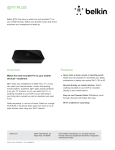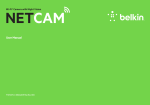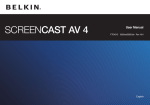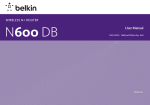Download Belkin @TV Plus
Transcript
Watch live and recorded TV on your mobile devices—anywhere. @TVplus User Manual G1V1000 • 8820ed01176uk Rev. A00 Table Of Contents SETUP AND INSTALLATION . . . . . . . . . . . . . . . . . . . . . . . . . . . . . . . . 1 Connecting to your cable or satellite set-top box . . . . . . . . . . . . . . 3 Installing and Setting up the Adapter . . . . . . . . . . . . . . . . . . . . . . . . 4 Connecting to your cable or satellite set-top box . . . . . . . . . . . . . . 5 Accessing your TV, Anywhere . . . . . . . . . . . . . . . . . . . . . . . . . . . . . 13 Tech support, Regulatory and Warranty . . . . . . . . . . . . . . . . . . . . . 14 SETUP AND INSTALLATION 1. Getting @TV connected to your home network The @TV setup software for PC and Mac is the best way to configure @TV. Visit http://www.belkin.com/mytveverywhere to download the software. a.Wired i. Direct connection via an Ethernet cable will provide the best possible performance for your @TV product. Simply connect the cable to one of the open ports on your broadband-connected network router and then to the Ethernet port on your @TV. ii. If you have trouble getting your @TV to connect with your router, first make sure that the network cables are attached properly to both devices. Then try restarting your router or cable/DSL modem: unplug the devices for 30 seconds, plug them back in, and they should find one another. b.Wireless i. I n order to get your @TV onto your home wireless network, follow the directions in the setup software. ii. If your router is WPS (Wi-Fi Protected Setup) enabled, you can also follow your router’s instructions for how to connect devices to it using that feature; this will not always work for all router/@TV combinations, but should work for most. The red @TV WPS button is located on the right side of the product as you face it, just next to the USB service port. 1 SETUP AND INSTALLATION c. Advanced network connections @TV will use UPnP to configure our network connection. In some cases you will need to use your router’s setup pages to change a few settings. i. Apple using 3G/4G 1. In order to access @TV on a 3G or 4G network using an Apple product like an iPhone, you may need to modify your Port Forwarding settings. These settings allow your @TV app and your @TV box to connect through your router by opening specific ports (you can think of these as doorways linking your @TV and your @TV apps). The following section explains how to make those changes. ii. Manual Port Forwarding settings 1. Open your router settings page and find the “Port Forwarding” or “Virtual Servers” section (Belkin routers call this “Virtual Servers”; most brands use the term “Port Forwarding”). 2. Make the following setting changes on this page: a. First open port 56123 for both UDP and TCP traffic b. Then, open port 49177 to TCP traffic 3. Save the settings. Once these settings are saved in your router, you should have access to @TV on iOS devices over a 3G or 4G connection. iii. More complex networks (NAT/firewall issues) 1. In some cases your @TV may be behind more than one router: apartment complexes with shared Internet services or homes with Wi-Fi extenders or Wi-Fi bridges would fall into this category. In these situations, you will need to also configure the second router or firewall device with the same Port Forwarding settings as above. 2 Connecting to your cable or satellite set-top box 2. Connecting to your cable or satellite set-top box ii. Audio inputs: your @TV has a traditional RCA-style composite input available for both the right and left channels of audio from your cable or satellite box. c. Other issues i. H DMI syncing In rare cases, certain cable or satellite boxes automatically disable analog outputs like the ones @TV uses whenever an HDMI enabled device (like an HDTV) is connected to them; this is because that particular cable or satellite box manufacturer has chosen to enable advanced content protection protocols that are triggered by your TV/STB combination. The best workaround is to utilize @TV’s HD pass-through feature and take the 1080i component cable signal from your cable or satellite box and pass it through to your television. This will enable you to enjoy @TV and also watch your cable or satellite on your HDTV in 1080i quality. iii. IR blasters (infrared) to control your set-top box: your @TV comes with a set of IR blasters. These plug into the back of the @TV and allow it to send IR commands to your cable or satellite box, just like your home remote control. Identifying where your cable or satellite box receives the commands from its remote control will help you place them in the optimal location. ii. A udio troubleshooting. If you are experiencing distortion or another audio issue, please check to make sure that the cables connecting your cable or satellite box to your @TV are attached correctly. Turning on your TV to listen to the audio and switching to other channels will help you pinpoint whether it is an issue with the broadcast or something else. something else. b. Video pass-through i. T his feature is useful only if you currently have your cable box connected to your home TV with the same connections that you would like to use for your @TV; it allows you to directly pass the input video from your cable or satellite box through the @TV to your home TV. If you have your TV connected to your cable or satellite box via HDMI and have free component or composite connections, you have no need to use the video out connections. d. Advanced settings tab i. Video a. Connections i. V ideo inputs from your set-top box to your @TV: You can connect your @TV to your cable or satellite box via composite or component cables; we recommend component because they provide better overall video quality. 3 Installing and Setting up the Adapter 1. Input a. Component vs. Composite i. Allows you to select which input on your @TV you would like to use. We recommend using component as it provides the highest video quality. ii. I t is possible to attach two separate devices to @TV and toggle between these inputs in your App. However, as there is only one audio input, you would need to either listen in mono (dedicate the left channel to one device and the right to the other device) or purchase an audio splitter separately. b. Hue, saturation, brightness, contrast i. Various settings to help you optimize the look of your @TV’s video c. Default i. Automatically resets the picture optimization settings to their initial settings 4 Connecting to your cable or satellite set-top box 2. Device/STB f. Show all commands/test i. This button allows you to test remote commands to make sure that you have the proper settings in place. We recommend that you select the “Show all commands” box and test multiple commands to ensure your setup is perfect. This section is used to manually configure your remote control settings so that your @TV can control your set-top box. We recommend that you use the @TV setup software to configure your @TV box, but these tools are available for expert users. a. Device category i. Remote codes are grouped into various categories based on standard industry practices. This can be somewhat confusing as a device category like “VCR” can also refer to a set-top box that is a Digital Video Recorder (DVR). Use “Digital Video Disk” only if you are attaching an @TV to a DVD player or other similar product. b. Manufacturer i. Once you’ve identified the device category, your settop box manufacturer should be found in this list. c. Select by model i. Manually select the model number here. d. Select by code i. If you happen to know your product’s IR code set, this setting allows you to manually select it. e. Command duration i. This setting allows you to adjust the speed at which the @ TV sends IR commands to your set-top box. For instance, if you are trying to switch to channel 425 and continue to arrive at channel 42, then channel 5, you should experiment with shortening the duration of remote commands. 5 Connecting to your cable or satellite set-top box 3. IR-Learning b. From the list below, select the command that you are trying to capture and then click “Learn.” In this section you can help your @TV “learn” remote commands. This is particularly useful if you have a cable or satellite box not currently supported by @TV. The steps are as follows: c. F ollow the onscreen instructions and repeat until you capture all of the remote commands you will need to control your cable or satellite box. a. S elect the appropriate device you are trying to control from the “Command Mapping” list. d. W hen you are done, click “Save.” 6 Installing and Setting up the Adapter 4. IR-Channel Tuning a. C able and set-top boxes vary in what they require when you enter a channel. For instance, on some boxes going to channel 42 requires just that you enter 42 while on another you must enter 042 or 0042. This section allows you to manually configure your @ TV so that it works well with your set-top box. 7 Connecting to your cable or satellite set-top box 5. Wake-up a. S ome boxes require a “wake-up” command; in this section you can automatically set that command when you start streaming from your settop box to your @TV app. For most cable or satellite boxes, these commands are automatically configured when you select that code set. However, in some cases you may want to adjust the settings. If this section is not available for adjustment, it means that the code set for the box you have selected indicates that a wake-up command is not necessary. 8 Connecting to your cable or satellite set-top box ii. Network This section allows you to manually configure how your @TV interacts with your home network. 1. Radio Here you can adjust how your @TV uses its Wi-Fi capabilities. a. Ad-Hoc vs. Client Mode vs. Radio Off i. Select the mode appropriate to your network setup; Radio Off means Wi-Fi is turned off ii. Most setups will only use Client Mode b.SSID i. You can either choose your network from the dropdown list or manually enter your network name. ii. Frequency 1. Band and Channel: this allows you to select the frequency ban and Wi-Fi channel used to talk to your router or access point. 2. Encryption Type: select the type of security your network uses; if you don’t have a password, select “none.” 3. Security Key/Confirm Key: enter your network’s password here and confirm it again. 9 Connecting to your cable or satellite set-top box 2. Client IP Settings – Manual Configuration This is for advanced network users to give your @TV a specific IP address and/or DNS server address. iii. Admin 1. Password change: allows you to change your @TV’s password 10 Connecting to your cable or satellite set-top box iv. Update 2. Firmware a. Firmware is the software code that runs inside your @TV box. We recommend that you allow it to automatically check for updates every day. You can also manually update it by downloading the firmware from the @TV support website and using the “manually select” feature. 1. Software a. Use the version of your @TV setup software for troubleshooting and also automatically update it to the latest version. 11 Connecting to your cable or satellite set-top box v. Info 2. Ports a. Allows you to test to see whether your Port Forwarding settings are correct and working properly. b. UPnP is an automated approach to configuring your router; most routers allow @TV to automatically configure your router ports using this feature. c. For routers that do not have UPnP compatibility, you will have to manually configure the ports. You can test to see whether your manually configured ports are working correctly by clicking the “Test” button. 1. Summary of your current @TV setup. This information is useful for any troubleshooting that is necessary as it provides key info about your configuration. All of the sections except the “Ports” tab are for information only. 12 Accessing your TV, Anywhere 3. Accessing your TV, Anywhere ii. @ TV optimizes the video and audio stream it sends based on the types of devices that are receiving the stream. In the case of multiple streams in your home, the device that has the lowest resolution and lowest available bandwidth will determine the video feeds all of the other devices will receive. For instance, if you have five tablets but one is at the edge of your Wi-Fi network (and thus able to receive less video and audio data), all of the streaming devices will see the picture quality adjusted downward to support the device that is on the edge of the network. Likewise, if you have a mix of devices, such as tablets and phones, you will see the overall resolution reduced to match what the smallest device can receive. a. General overview i. S imply put, @TV takes the video and audio signals from your cable or satellite box and sends them over the Internet to your phone, tablet, or computer. b. Out of home i. When you access @TV from outside your home network (like from a Wi-Fi hotspot or from a 3G or 4G phone), that stream is the only stream available. Any additional users trying to access your @TV box—either from out of the home or in the home—will see a message stating that someone else is using @TV. d. Other issues: who controls the TV? i. When you use @TV you will be taking control of your living-room cable of satelitte box. If someone else is watching and you change the channel, he or she will be watching right along with you. c. In home i. You can have up to eight devices accessing @TV within your home network at a time. However, video performance will be dependent on your router’s capability to handle large amounts of streaming content, so as you add additional users you will likely see reduced picture and audio quality. 13 Tech support, Regulatory and Warranty Technical Support Country Number Internet adress AUSTRIA 0820 200766 www.belkin.com/de/networking/ BELGIUM 07 07 00 073 www.belkin.com/nl/networking/ www.belkin.com/fr/networking/ CZECH REPUBLIC 239 000 406 www.belkin.com/uk/networking/ DENMARK 701 22 403 www.belkin.com/uk/networking/ FINLAND 0972519123 www.belkin.com/uk/networking/ FRANCE 08 - 25 54 00 26 www.belkin.com/fr/networking/ GERMANY 0180 - 500 57 09 www.belkin.com/de/networking/ GREECE 00800 - 44 14 23 90 www.belkin.com/uk/networking/ HUNGARY 06 - 17 77 49 06 www.belkin.com/uk/networking/ ICELAND 800 8534 www.belkin.com/uk/networking/ IRELAND 0818 55 50 06 www.belkin.com/uk/networking/ ITALY 02 - 69 43 02 51 www.belkin.com/it/networking/ LUXEMBOURG 34 20 80 85 60 NETHERLANDS 0900 - 040 07 90 NORWAY 81 50 0287 www.belkin.com/uk/networking/ POLAND 00800 - 441 17 37 www.belkin.com/uk/networking/ You can find technical-support information on our website, www.belkin.com, by navigating to the tech-support section. PORTUGAL 707 200 676 www.belkin.com/uk/networking/ RUSSIA 8-800-555-0231 www.belkin.com/networking/ If you want to contact technical support by phone, please call the number you need from this list*: SLOVAKIA 08000 04614 www.belkin.com/networking/ SLOVENIA 0800 80510 www.belkin.com/networking/ SOUTH AFRICA 0800 - 99 15 21 www.belkin.com/uk/networking/ SPAIN 902 - 02 43 66 www.belkin.com/es/networking/ SWEDEN 07 - 71 40 04 53 www.belkin.com/uk/networking/ SWITZERLAND 08 - 48 00 02 19 www.belkin.com/de/networking/ www.belkin.com/fr/networking/ UNITED KINGDOM 0845 - 607 77 87 www.belkin.com/uk/networking/ OTHER COUNTRIES +44 - 1933 35 20 00 US http://www.belkin.com/support UK http://www.belkin.com/uk/support Australia http://www.belkin.com/au/support New Zealand http://www.belkin.com/au/support Singapore 1800 622 1130 Europe http://www.belkin.com/uk/support *Local rates apply. 14 www.belkin.com/uk/networking/ €0.10 per minute www.belkin.com/nl/networking/ Tech support, Regulatory and Warranty Belkin International, Inc., Limited 2-Year Product Warranty What is not covered by this warranty? All above warranties are null and void if the Belkin product is not provided to Belkin for inspection upon Belkin’s request at the sole expense of the purchaser, or if Belkin determines that the Belkin product has been improperly installed, altered in any way, or tampered with. The Belkin Product Warranty does not protect against acts of God such as flood, lightning, earthquake, war, vandalism, theft, normal-use wear and tear, erosion, depletion, obsolescence, abuse, damage due to low voltage disturbances (i.e. brownouts or sags), non-authorized program, or system equipment modification or alteration. What this warranty covers. Belkin International, Inc. (“Belkin”) warrants to the original purchaser of this Belkin product that the product shall be free of defects in design, assembly, material, or workmanship. What the period of coverage is. Belkin warrants the Belkin product for two years. What will we do to correct problems? Product Warranty. Belkin will repair or replace, at its option, any defective product free of charge (except for shipping charges for the product). Belkin reserves the right to discontinue any of its products without notice, and disclaims any limited warranty to repair or replace any such discontinued products. In the event that Belkin is unable to repair or replace the product (for example, because it has been discontinued), Belkin will offer either a refund or a credit toward the purchase of another product from Belkin.com in an amount equal to the purchase price of the product as evidenced on the original purchase receipt as discounted by its natural use. 15 Tech support, Regulatory and Warranty How to get service. To get service for your Belkin product you must take the following steps: 2.Your Belkin Customer Service Representative will then instruct you on how to forward your receipt and Belkin product and how to proceed with your claim. 1.Contact Belkin Tech Support at the number listed on page 14, within 15 days of the Occurrence. Be prepared to provide the following information: a. T he part number of the Belkin product. b. W here you purchased the product. c. W hen you purchased the product. d. C opy of original receipt. Belkin reserves the right to review the damaged Belkin product. All costs of shipping the Belkin product to Belkin for inspection shall be borne solely by the purchaser. If Belkin determines, in its sole discretion, that it is impractical to ship the damaged equipment to Belkin, Belkin may designate, in its sole discretion, an equipment repair facility to inspect and estimate the cost to repair such equipment. The cost, if any, of shipping the equipment to and from such repair facility and of such estimate shall be borne solely by the purchaser. Damaged equipment must remain available for inspection until the claim is finalized. Whenever claims are settled, Belkin reserves the right to be subrogated under any existing insurance policies the purchaser may have. 16 Tech support, Regulatory and Warranty How state law relates to the warranty. THIS WARRANTY CONTAINS THE SOLE WARRANTY OF BELKIN. THERE ARE NO OTHER WARRANTIES, EXPRESSED OR, EXCEPT AS REQUIRED BY LAW, IMPLIED, INCLUDING THE IMPLIED WARRANTY OR CONDITION OF QUALITY, MERCHANTABILITY OR FITNESS FOR A PARTICULAR PURPOSE, AND SUCH IMPLIED WARRANTIES, IF ANY, ARE LIMITED IN DURATION TO THE TERM OF THIS WARRANTY. Some states do not allow limitations on how long an implied warranty lasts, so the above limitations may not apply to you. IN NO EVENT SHALL BELKIN BE LIABLE FOR INCIDENTAL, SPECIAL, DIRECT, INDIRECT, CONSEQUENTIAL OR MULTIPLE DAMAGES SUCH AS, BUT NOT LIMITED TO, LOST BUSINESS OR PROFITS ARISING OUT OF THE SALE OR USE OF ANY BELKIN PRODUCT, EVEN IF ADVISED OF THE POSSIBILITY OF SUCH DAMAGES. This warranty gives you specific legal rights, and you may also have other rights, which may vary from state to state. Some states do not allow the exclusion or limitation of incidental, consequential, or other damages, so the above limitations may not apply to you. 17 Tech support, Regulatory and Warranty Regulatory and Safety Information • Reorient or relocate the receiving antenna. • Increase the distance between the equipment and the receiver. •Connect the equipment to an outlet on a circuit different from that to which the receiver is connected. • Consult the dealer or an experienced radio/TV technician for help. DECLARATION OF CONFORMITY WITH ELECTROMAGNETIC COMPATIBILITY AND ELECTROMAGNETIC INTERFERENCE We, Belkin International, Inc., of Schiphol-Rijk, Netherlands, declare under our sole responsibility that the device, G1V1000, complies with Directives stated in our EU declaration which can be obtained from our website given below. Caution: Any changes or modifications not expressly approved by the party responsible for compliance could void the user’s authority to operate this equipment.This device and its antenna(s) must not be co-located or operating in conjunction with any other antenna or transmitter. Caution: Exposure to Radio Frequency Radiation. This equipment complies with radiation exposure limits set forth for an uncontrolled environment. This equipment should be installed and operated with a minimum distance of 20cm between the radiator and your body. Europe – EU Declaration of Conformity This device complies with the essential requirements of the R&TTE Directive 1999/5/EC, the EMC Directive 2004/108/ EC, and the low-voltage Directive 2006/95/EC. A copy of the European Union CE marking “Declaration of Conformity” may be obtained at the website: www.belkin.com/doc CISPR 22 Interference Notice This equipment has been tested and found to comply with the limits for a Class B digital device, pursuant to the requirements of EN 55022 and EN 55024. These limits are designed to provide reasonable protection against harmful interference in a residential installation. For information on product disposal please refer to http://environmental.belkin.com General Safety Information: This equipment generates, uses, and can radiate radio frequency energy, and if not installed and used in accordance with the instructions, may cause harmful interference to radio communications. However, there is no guarantee that interference will not occur in a particular installation. If this equipment does cause harmful interference to radio or television reception, which can be determined by turning the equipment off and on, the user is encouraged to try and correct the interference by one or more of the following measures: • For indoor installation only • For installation with supplied power adapter only • The supplied power adapter is the product’s switch-off device. The base socket must be near the product and easily accessible. 18 © 2012 Belkin International, Inc. All rights reserved. All trade names are registered trademarks of respective manufacturers listed. Belkin Ltd. Express Business Park Shipton Way, Rushden NN10 6GL, United Kingdom Belkin SAS 130 rue de Silly 92100 Boulogne-Billancourt, France Belkin GmbH Otto-Hahn-Straße 20 85609 Aschheim Germany Belkin Iberia Avda de Barajas, 24, Edificio Gamma, 4ªpta, 28108 Alcobendas Madrid - Spain Belkin Italy & Greece Via Nino Bonnet, 4/6 Milan 20154 Italy Belkin B.V. Tupolevlaan 1 1119 NW Schiphol-Rijk, Netherlands


































